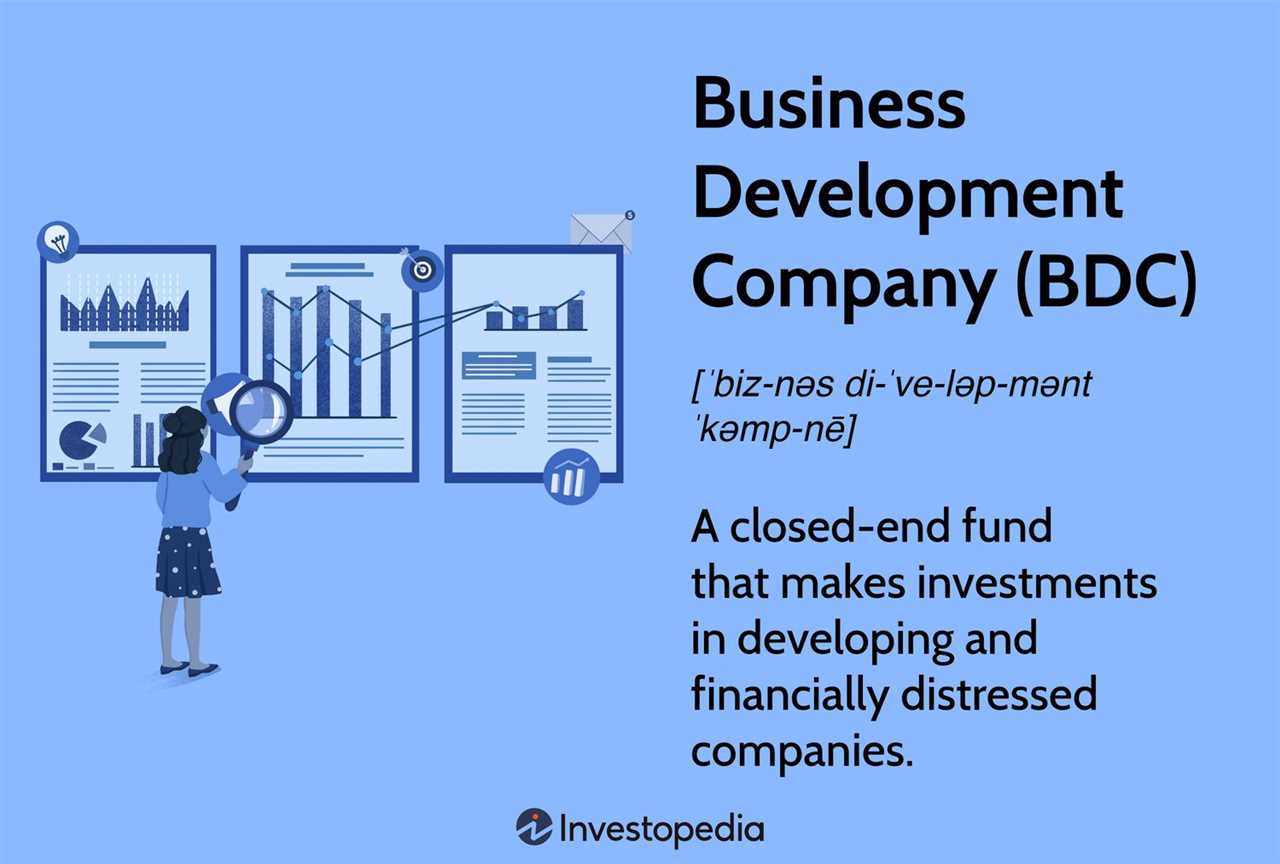What is a Business Development Company (BDC)?

A Business Development Company (BDC) is a type of investment company that provides financing and capital to small and mid-sized businesses. BDCs are regulated by the Securities and Exchange Commission (SEC) and are required to invest in private and public companies that meet certain criteria.
BDCs are similar to mutual funds, but they focus on investing in private companies rather than publicly traded stocks and bonds. They are designed to provide individual investors with access to the private equity market, which is typically only available to institutional investors and high-net-worth individuals.
One of the key advantages of investing in a BDC is the potential for high returns. BDCs typically invest in companies that are in the early stages of growth or undergoing a turnaround, which can offer significant upside potential. Additionally, BDCs often pay out a portion of their profits in the form of dividends, providing investors with a regular income stream.
Investing in a BDC can be a way to diversify a portfolio and gain exposure to a wide range of industries and sectors. BDCs typically invest in a variety of companies across different sectors, which can help to spread risk and reduce the impact of any individual investment.
Definition and Overview
A Business Development Company (BDC) is a type of investment company that primarily focuses on providing capital and financial support to small and medium-sized businesses. BDCs are regulated by the Securities and Exchange Commission (SEC) and are required to distribute at least 90% of their taxable income to shareholders in the form of dividends.
BDCs typically invest in a wide range of industries, including technology, healthcare, manufacturing, and energy. They provide funding to these companies through various means, such as loans, equity investments, and mezzanine financing. By offering capital and expertise, BDCs help these businesses grow and expand.
Advantages of Investing in a BDC
Investing in a BDC can offer several advantages:
- High Dividend Yields: BDCs are required to distribute a significant portion of their income to shareholders, which can result in attractive dividend yields.
- Diversification: BDCs invest in a portfolio of different companies, providing investors with diversification and potentially reducing risk.
- Access to Private Market Opportunities: BDCs often invest in private companies that are not available to individual investors, providing access to potentially lucrative investment opportunities.
Risks of Investing in a BDC
While investing in a BDC can offer attractive returns, it also comes with certain risks:
- Business and Economic Risks: The success of a BDC’s investments is dependent on the performance of the underlying businesses and the overall economic conditions.
- Interest Rate Risk: BDCs may be exposed to interest rate fluctuations, which can impact the cost of their borrowings and the profitability of their investments.
- Liquidity Risk: BDCs may face challenges in selling their investments quickly, which can limit their ability to meet redemption requests from shareholders.
- Regulatory and Compliance Risks: BDCs are subject to regulatory oversight and compliance requirements, which can impact their operations and profitability.
Conclusion
Business Development Companies (BDCs) provide investors with an opportunity to invest in a diversified portfolio of small and medium-sized businesses. While they offer attractive dividend yields and potential for capital appreciation, investing in BDCs also comes with certain risks. It is important for investors to carefully evaluate the investment strategy, track record, and financial health of a BDC before making any investment decisions.
How to Invest in a Business Development Company (BDC)
Investing in a Business Development Company (BDC) can be a great way to diversify your investment portfolio and potentially earn attractive returns. Here are some steps to consider when investing in a BDC:
1. Research and Understand BDCs
Before investing in a BDC, it is important to research and understand what they are and how they operate. BDCs are publicly traded companies that invest in small and medium-sized businesses. They provide financing to these companies in exchange for equity or debt securities.
2. Evaluate the BDC’s Investment Strategy
Each BDC has its own investment strategy, which can vary from focusing on specific industries to investing in a diversified portfolio of companies. It is important to evaluate the BDC’s investment strategy and determine if it aligns with your investment goals and risk tolerance.
3. Review the BDC’s Financial Performance
Before investing in a BDC, it is crucial to review its financial performance. This includes analyzing its historical returns, revenue growth, and profitability. Additionally, it is important to review the BDC’s management team and their track record in managing investments.
4. Assess the BDC’s Risk Profile
5. Consider Diversification
Like any investment, it is important to diversify your portfolio when investing in BDCs. This can help mitigate risk and potentially increase returns. Consider investing in multiple BDCs with different investment strategies and risk profiles.
6. Consult with a Financial Advisor

Investing in BDCs can be complex, and it is always a good idea to consult with a financial advisor before making any investment decisions. A financial advisor can provide guidance based on your individual financial situation and investment goals.
By following these steps and conducting thorough research, you can make informed investment decisions when investing in a Business Development Company (BDC).
A Guide to Mutual Funds
What is a Mutual Fund?
A mutual fund is a type of investment vehicle that pools money from multiple investors to invest in a diversified portfolio of stocks, bonds, or other securities. The fund is managed by professional money managers who make investment decisions on behalf of the investors.
Advantages of Mutual Funds
There are several advantages to investing in mutual funds:
- Diversification: Mutual funds allow you to invest in a wide range of securities, which helps to spread out your risk. This can be particularly beneficial for investors who do not have the time or expertise to research and select individual stocks or bonds.
- Professional Management: With mutual funds, you benefit from the expertise of professional money managers who have the knowledge and experience to make informed investment decisions.
- Liquidity: Mutual funds are generally highly liquid, which means you can buy or sell your shares at any time. This provides you with flexibility and easy access to your investment.
- Affordability: Mutual funds typically have low minimum investment requirements, making them accessible to a wide range of investors.
How to Invest in Mutual Funds
Investing in mutual funds is relatively straightforward. Here are the steps to get started:
- Set Your Investment Goals: Determine your investment goals, such as saving for retirement, buying a house, or funding your child’s education. This will help you choose the right mutual funds that align with your objectives.
- Open an Account: To invest in mutual funds, you will need to open an account with a brokerage firm or a mutual fund company. The account opening process typically involves providing personal information, such as your name, address, and social security number.
- Invest: Once your account is open, you can start investing in mutual funds. You can choose to invest a lump sum amount or set up regular contributions through automatic investment plans.
Conclusion
Investing in mutual funds can be a smart way to grow your wealth and achieve your financial goals. By diversifying your investments and benefiting from professional management, you can potentially earn a return on your investment. Take the time to educate yourself, set clear investment goals, and choose the right mutual funds that align with your objectives. With careful planning and consistent investing, you can build a strong investment portfolio with mutual funds.

Emily Bibb simplifies finance through bestselling books and articles, bridging complex concepts for everyday understanding. Engaging audiences via social media, she shares insights for financial success. Active in seminars and philanthropy, Bibb aims to create a more financially informed society, driven by her passion for empowering others.
